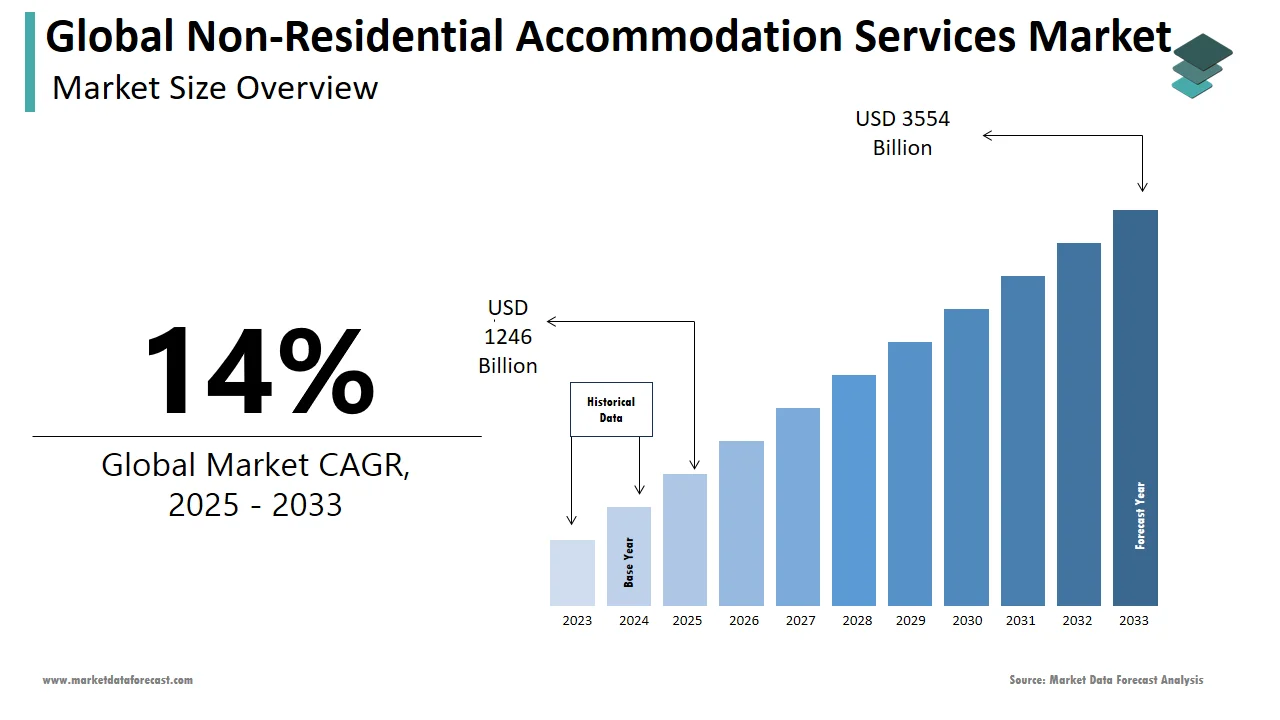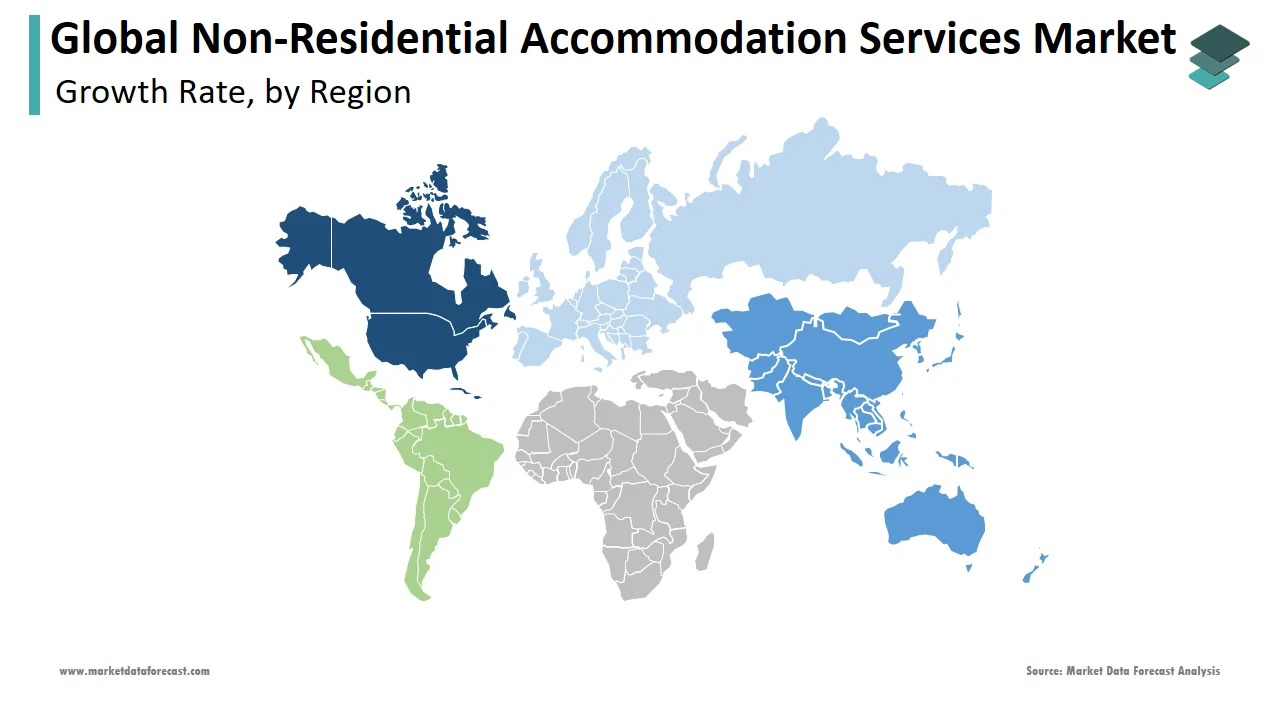Global Non-Residential Accommodation Services Market Size, Share, Trends & Growth Forecast Report By Entities (Organizations, Sole Traders and Partnerships) and Region (North America, Europe, Asia-Pacific, Latin America, Middle East and Africa), Industry Analysis From 2025 To 2033.
Global Non-Residential Accommodation Services Market Size
The global non-residential accommodation services market is expected to grow at a CAGR of 14% during the forecast period 2025-2033. The market value was at USD 1,093 billion in 2024, and the value is expected to reach USD 3554 billion by the end of 2033 from USD 1246 billion in 2025.

The non-residential accommodation services market comprises the products by entities that offer small-time stay or lodging to travelers, vacationers, and others. There is a broad variety of services offered in this industry. Some establishments only offer lodges, while others offer only meals, laundry services, and recreational facilities. Accommodation establishments are classified in this subsector even if the provision of ancillary services generates more income. The types of ancillary services provided vary from one establishment to another. The non-residential accommodation services market is segregated into hotels and other travel accommodations, camping and caravanning, and non-residential accommodation for students and workers.
MARKET TRENDS
The market for non-residential accommodation services offers a forward-looking perspective on critical factors such as growth drivers and constraints affecting industry dynamics. It also offers various risk prevention plans to help industry players seize opportunities with high-profit potential. Wellness travel is on the hype in the accommodation industry. That includes classic yoga retreats and spa experiences, a detox menu, meditation sessions, extreme fitness boot camps, hot springs, and hot springs, cycling vacations, and more. More and more travelers are seeking holistic vacation experiences and are adding amenities to their properties that include yoga classes, expanded gyms, and spas. For example, major hotel and resort brands such as Starwood Hotels and InterContinental Hotels Group have launched their own hotel brands dedicated to wellness.
MARKET DRIVERS
The increasing use of social media and access to the media is having a positive impact on the tourism and non-residential accommodation industries.
With tourists sharing their travel information, photos, and videos on social media platforms, people are becoming more and more aware of the tourist destinations and leisure experiences that the different countries of the world offer. In addition, social media plays an important role in helping countries promote tourism by making people aware of their culture. This growing awareness is reflected in large numbers of people traveling abroad and is estimated to drive the growth of the non-residential accommodation industry during the foreseen period.
MARKET OPPORTUNITIES
Hotels are using technologies to improve the guest experience and reduce operating costs.
The most important trends include the use of near-field communication technology (NFC), infrared technologies, and robots. NFC gives users the ability to exchange data between devices, making mobile payments an instant and secure process. Infrared sensors are used in hotels to address guest complaints about service interruptions. Hotels also use robots to provide room amenities and for other functional purposes. Hotel operators are investing in systems and technologies that can automate processes and personalize the guest experience.
REPORT COVERAGE
|
REPORT METRIC |
DETAILS |
|
Market Size Available |
2024 to 2033 |
|
Base Year |
2024 |
|
Forecast Period |
2025 to 2033 |
|
CAGR |
14% |
|
Segments Covered |
By Entities and Region. |
|
Various Analyses Covered |
Global, Regional & Country Level Analysis, Segment-Level Analysis, DROC, PESTLE Analysis, Porter’s Five Forces Analysis, Competitive Landscape, Analyst Overview of Investment Opportunities |
|
Regions Covered |
North America, Europe, APAC, Latin America, Middle East & Africa |
|
Market Leaders Profiled |
Starwood Hotels, Marriott International, Hilton Worldwide, InterContinental Hotels Group, Hyatt Hotels Corporation, Four Seasons Hotels & Resorts, and Others. |
REGIONAL ANALYSIS
North America was the largest region in the market for non-residential accommodation services in 2024, accounting for about 35% of the market share. Asia-Pacific was the second largest region, with around 25% market share. Africa was the smallest region, with around a 3% market share. European nations also contribute significantly to this market with the presence of several tourist attractions like Rome, Paris, Venice, Amsterdam, and many more. Middle Eastern nations like Dubai and Turkey are also significant growth promoters of this industry.
KEY MARKET PLAYERS
Companies playing a prominent role in the global non-residential accommodation services market include Starwood Hotels, Marriott International, Hilton Worldwide, InterContinental Hotels Group, Hyatt Hotels Corporation, Four Seasons Hotels & Resorts, and Others.
RECENT MARKET HAPPENINGS
- Welcomhotel has introduced its first area in Himachal Pradesh, Welcomhotel Shimla, parent hotel chain ITC Hotels. The Welcomhotel Shimla has 47 rooms and suites overlooking the Mashobra Valley.
- Booking.com launches a fund for sustainable travel startups. The startups to be funded will be selected as part of the travel platform acceleration program. Participants offering innovative products and services, including accommodation, will have the opportunity to win grants from the company's Rs 18.5 million funds.
MARKET SEGMENTATION
This research report on the global non-residential accommodation services market has been segmented and sub-segmented based on entities and region.
By Entities
- Organizations
- Sole Traders
- Partnerships
By Region
- North America
- Europe
- Asia Pacific
- Latin America
- Middle East & Africa
Related Reports
Access the study in MULTIPLE FORMATS
Purchase options starting from $ 2500
Didn’t find what you’re looking for?
TALK TO OUR ANALYST TEAM
Need something within your budget?
NO WORRIES! WE GOT YOU COVERED!
Call us on: +1 888 702 9696 (U.S Toll Free)
Write to us: [email protected]
